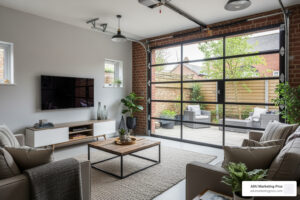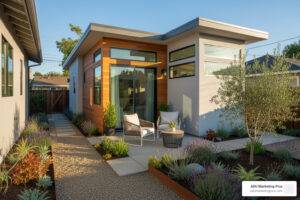Understanding the True Cost of Your Garage Remodel
On average, the cost garage remodel projects range from $6,000 to $27,000, but this is just a starting point. Your final investment depends entirely on the scope of your vision. Are you looking for a simple weekend refresh or a full-scale conversion that adds a new bedroom or even a rental apartment to your property? Understanding these costs upfront is the first step toward a smooth, successful, and surprising-free project.
Quick Cost Overview:
- Cosmetic updates: $3,000–$5,000 (painting, modern lighting, smart storage)
- Full remodel: $7,000–$15,000 (new flooring, insulation, drywall, new garage door)
- Living space conversion: $20,000–$75,000+ (home office, bedroom, ADU)
For decades, the garage was an afterthought—a cluttered space for cars, forgotten boxes, and holiday decorations. But as homes evolve to meet the demands of remote work, multigenerational living, and the need for flexible spaces, homeowners are rediscovering this hidden asset. With rising housing costs making traditional additions prohibitively expensive, many are unlocking the immense potential behind their garage doors. National data shows homeowners typically spend around $11,000 on garage renovations, with projects returning an impressive 64% to 85% of their investment at resale.
Key cost drivers include the garage’s size, your geographic location, and its intended use. A two-car garage conversion isn’t simply double the cost of a one-car project due to fixed costs like permits and design fees. Location also plays a huge role; projects in California can cost 30-50% more than identical work in the Midwest. Labor is the largest variable, typically accounting for 40-50% of your total project cost, while permits and professional fees add another layer for complex conversions. Understanding these fundamentals is crucial for budgeting realistically and navigating your remodel with confidence.
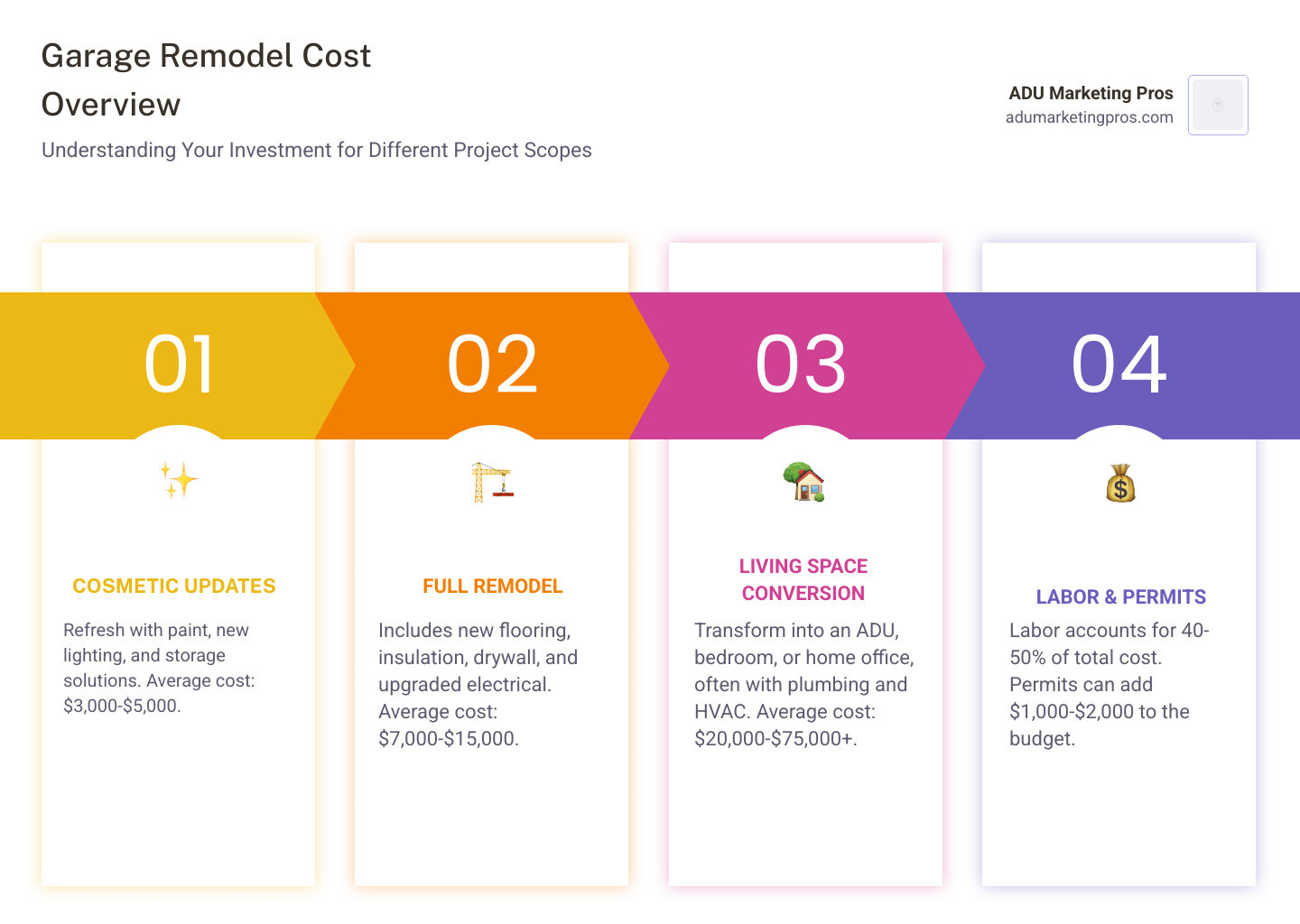
Average Garage Remodel Costs: A National Overview
Nationally, most homeowners invest between $6,000 and $27,000 for a garage remodel, with a typical project landing around $11,000. More comprehensive renovations, especially those touching on structural or systems work, often fall in the $15,000 to $25,000 range. Your garage’s size is a primary cost factor, as more square footage requires more materials and labor. However, fixed costs like permits and design fees can be more cost-effective when spread across a larger space.
| Garage Size (Approx.) | Average Remodel Cost Range | Average Conversion Cost Range |
|---|---|---|
| One-Car (240 sq ft) | $4,200 – $9,000 | $5,725 – $24,000 |
| Two-Car (440 sq ft) | $7,000 – $15,000 | $11,000 – $33,000 |
| Three-Car (660 sq ft) | $10,500 – $22,500 | $30,000 – $75,000+ |
Garage projects fall into three main categories, each with a distinct budget, timeline, and scope of work.
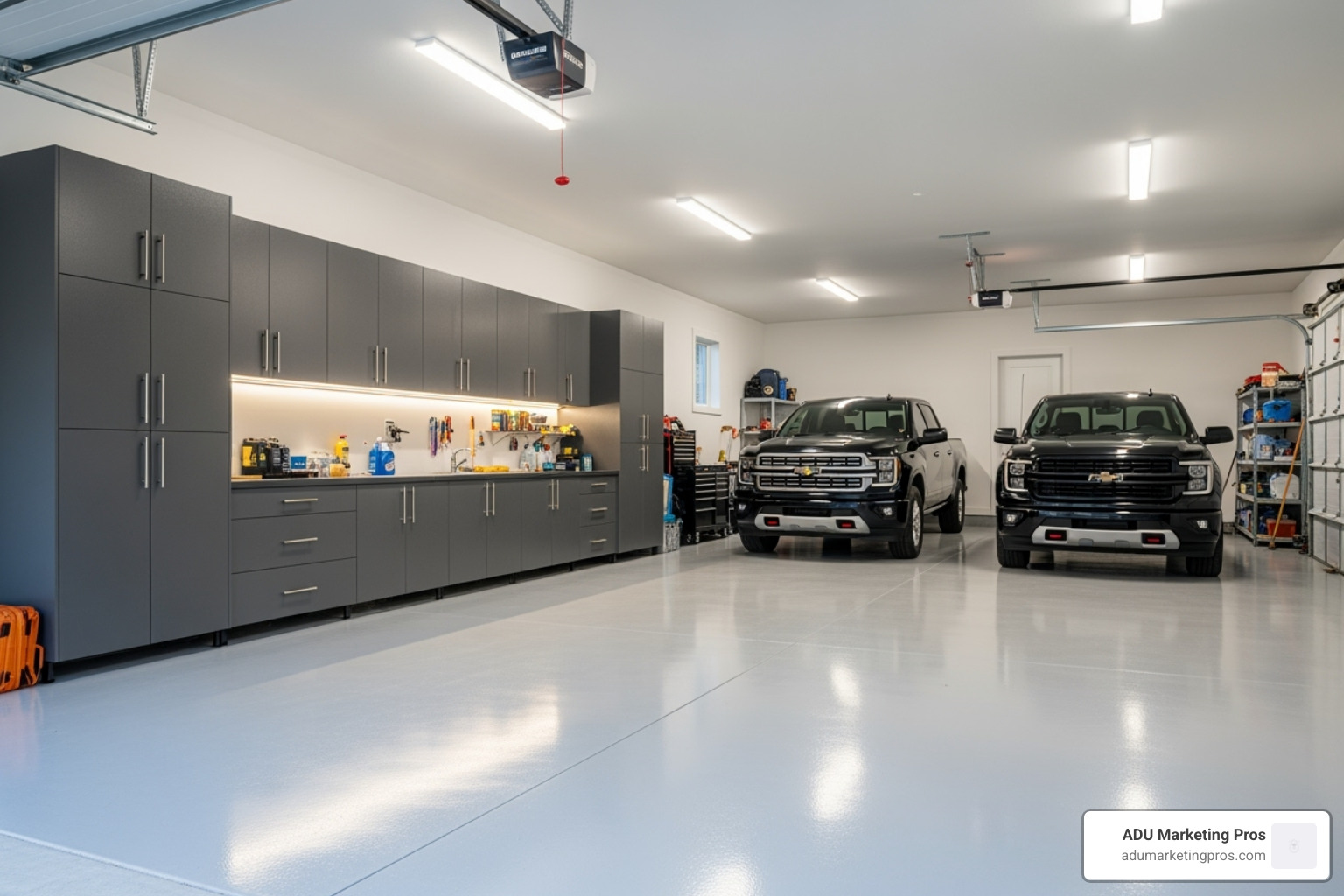
Cosmetic Updates
Cosmetic updates are the most budget-friendly approach, typically running $3,000 to $5,000. These projects focus on improving your garage’s appearance and function without major structural changes, making them ideal for a DIY-savvy homeowner.
- Fresh Paint: A professional paint job costs $2 to $3 per square foot. Using a high-quality, durable semi-gloss or satin paint can make the space feel brighter, larger, and easier to clean.
- Upgraded Lighting: Swapping out a single bare bulb for modern fixtures can cost $150 to $925. Consider a mix of ambient overhead lighting (like flush-mount LEDs) and task lighting over a workbench for maximum functionality.
- Smart Storage: Getting organized is transformative. Simple open shelving can be a few hundred dollars, while professional-grade slatwall systems or custom cabinets can range from $1,100 to $3,700. Overhead racks are great for long-term storage.
- Floor Recoating: An epoxy coating is a popular choice, costing around $4 to $9 per square foot installed. It creates a durable, stain-resistant, and easy-to-clean surface. Other options include polyaspartic coatings (more durable but pricier) or interlocking floor tiles.
A comprehensive cosmetic update for a standard two-car garage often costs around $3,500 and can be completed in a weekend or two.
Full Remodel
A full remodel addresses the garage’s core structure and systems, with costs typically ranging from $7,000 to $15,000. This creates a more finished, insulated, and comfortable space that feels like an extension of your home.
- New Flooring: Beyond coatings, you might install new flooring. Options range from polished concrete ($3-$8/sq ft) to durable luxury vinyl plank ($5-$10/sq ft) or rubber flooring for a home gym.
- Insulation: Insulating a standard two-car garage costs $1,000 to $2,500. Options include fiberglass batts, blown-in cellulose, or high-performance spray foam. This is a critical step for temperature control and energy efficiency.
- Drywall Installation: Finishing the walls with drywall costs $1,000 to $3,000. This makes the garage feel like a true room and is necessary for insulation and running electrical wiring.
- Garage Door Replacement: A new insulated garage door improves curb appeal, security, and energy efficiency, costing $1,200 to $3,400 on average. Materials range from basic steel to custom wood or composite.
- Electrical Upgrades: To support more than a single opener, upgrading wiring and adding outlets costs $1,000 to $3,000. This includes adding GFCI-protected outlets as required by code and potentially a dedicated circuit for a workshop or EV charger.
Living Space Conversion
Converting your garage into livable space is the most ambitious and expensive type of cost garage remodel, starting around $20,000 and often exceeding $75,000 for a full Accessory Dwelling Unit (ADU). These projects add valuable, conditioned square footage to your home and are subject to full residential building codes. Partial conversions into a home office or gym are less complex, while full ADU conversions require extensive structural modifications, plumbing, HVAC, and electrical work. While these projects represent the highest investment, they also offer the greatest potential return and functional improvement, which we’ll explore in detail later.
Key Factors That Influence the Cost of a Garage Remodel
While national averages provide a useful baseline, several key factors will determine your specific cost garage remodel. Your project’s final price tag is a complex interplay between the quality of materials you choose, the scope of work you undertake, and your geographic location.
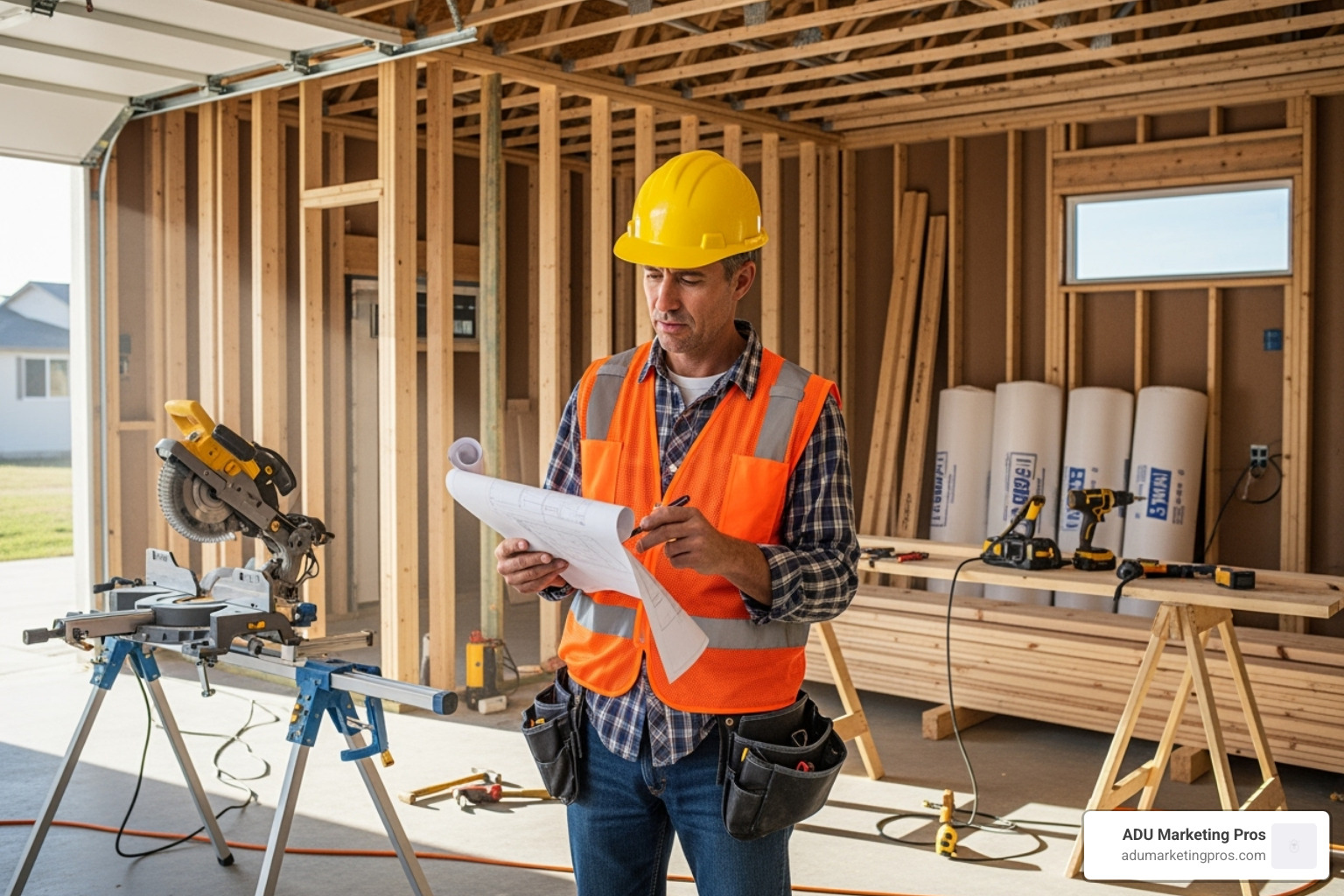
Size, Location, and Condition
These three foundational elements have the biggest impact on your remodeling budget.
- Size: While a larger garage naturally costs more in materials and labor, the cost per square foot often decreases as fixed expenses like permits and design fees are spread over a larger area. Expect to invest anywhere from $50 to $200 per square foot for conversions, depending on complexity.
- Location: Costs vary dramatically by region. A remodel in a high-cost-of-living area like San Jose, CA, can be 50% more expensive than the same project in a Midwestern city due to higher labor rates and stricter building codes. In colder climates, you must also consider the potential impact on home value if you eliminate the only covered parking space.
- Attached vs. Detached: An attached garage remodel is often cheaper because it allows for easier and less expensive connections to your home’s existing electrical, plumbing, and HVAC systems. Extending utilities to a detached structure requires trenching, which adds significant cost.
- Existing Condition: A garage in poor condition will inflate your budget. Be prepared for potential surprises. Common issues include foundation cracks ($250-$800 each to repair), leveling a sloped concrete slab ($3-$15 per sq ft), asbestos abatement ($5-$15 per sq ft), or mold remediation ($1,500-$4,000). It’s wise to budget an extra 10-20% of your total cost as a contingency fund for these unknowns.
Labor, Permits, and Professional Fees
These behind-the-scenes costs are a major part of any significant cost garage remodel.
- Labor Costs: Labor is typically the largest line item, accounting for 40-50% of the total budget. A general contractor will charge a 10-20% management fee on the project cost, but their expertise in scheduling, managing subcontractors (electricians, plumbers, etc.), and sourcing materials can save you money and headaches in the long run.
- Permits: Building permits average around $1,400 but can vary widely. They are almost always required for structural changes, new electrical or plumbing, and any change in occupancy (i.e., turning storage space into living space). The process involves plan submission, review, and multiple inspections. Skipping permits can lead to fines, costly rework, and major problems when you try to sell your home.
- Professional Fees: For complex conversions, you may need an architect or designer, who typically charge $100-$250 per hour or 5-20% of the total construction cost. Their detailed plans are often required to obtain building permits and ensure the final space is functional and code-compliant.
- Zoning and HOA Rules: Before spending a dime, check local zoning laws and Homeowners Association (HOA) restrictions. Some municipalities have minimum on-site parking requirements that can prevent a garage conversion. HOAs may have strict rules about exterior modifications. For more ideas, see these garage renovations that boost home value.
Essential System Upgrades: Electrical, Plumbing, and HVAC
Converting a garage from a car park to a living area means upgrading its basic systems to meet residential standards.
- Electrical: Upgrades typically cost $1,000 to $3,000. A livable space needs far more than a single outlet and a bare bulb. This cost includes adding multiple outlets ($125-$300 each), dedicated circuits for appliances, modern lighting fixtures, and potentially a new electrical subpanel to handle the increased load.
- Plumbing: Adding plumbing is one of the most expensive parts of a conversion, averaging $1,550 for basic additions but rising quickly. Tapping into existing sewer and water lines can be complex, especially on a concrete slab. A full bathroom can easily cost $10,000 to $30,000, depending on the proximity to existing lines and your choice of fixtures.
- HVAC: Climate control is essential for comfort and costs $1,000 to $5,000. Ductless mini-split systems are a popular and efficient choice for garages, as they provide both heating and cooling without needing to connect to your home’s existing ductwork. Other options include extending existing ducts (if feasible), window units, or radiant floor heating.
Cost Breakdown for Common Garage Projects and Conversions
To help with your cost garage remodel planning, let’s break down the costs of common upgrades and full-scale conversion projects. Understanding these itemized costs will help you prioritize your investments and build a realistic budget.
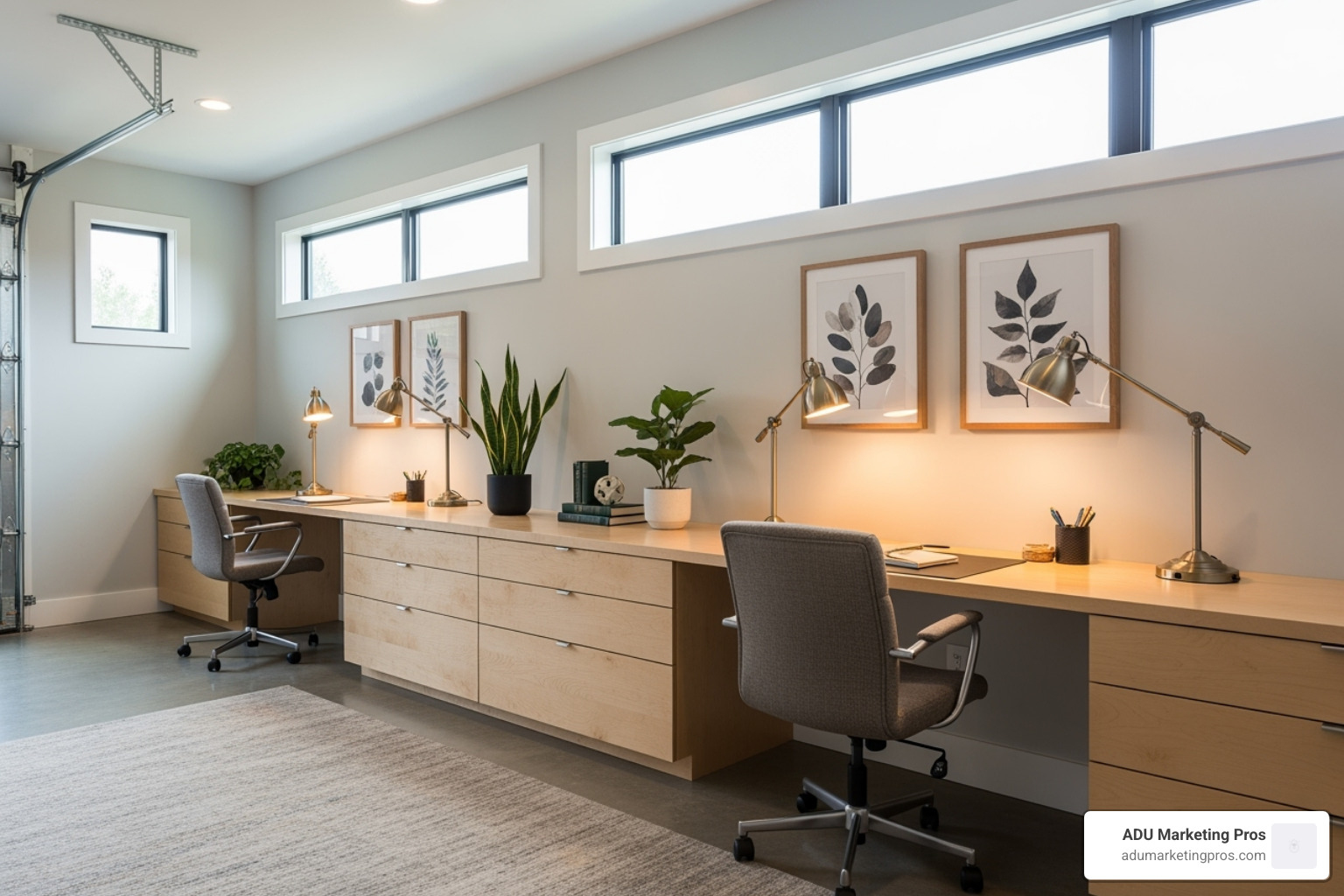
Specific Upgrades and Their Average Cost
Even if you’re not doing a full conversion, targeted improvements can modernize your garage and improve its utility.
- Garage Door Replacement: A high-ROI project, costing $1,200 to $3,400 for a standard two-car garage. An insulated door can significantly improve energy efficiency.
- Flooring: Epoxy or polyaspartic coating is a popular choice at $4 to $12 per square foot for a durable, professional finish. A full floor replacement for a two-car garage can range from $1,500 to $7,000 depending on the material.
- Insulation and Drywall: Properly finishing the interior is key. Expect to pay $1,000 to $2,500 for insulation and another $1,500 to $3,000 for drywall installation and finishing in a typical two-car garage.
- Windows: Adding natural light is transformative. Installing a new window costs between $300 and $1,200 per window, depending on size and type. For a bedroom conversion, an egress window is required by code and can cost $2,500 to $5,500.
- Storage and Cabinetry: Professional, wall-mounted storage solutions or custom cabinets typically cost between $1,100 and $3,700. Slatwall panels offer flexible, reconfigurable storage for tools and equipment.
- Soundproofing: If creating a home office, music room, or bedroom, soundproofing is a wise investment. Costs range from $500 for basic DIY methods to $4,000+ for professional solutions involving double drywall, resilient channels, and acoustic insulation.
The Cost to Convert a Garage into a Living Space
Converting your garage into livable space adds the most value but also comes with the highest cost. Prices vary dramatically based on the intended use and level of finish.
- Home Office: A relatively straightforward conversion, a home office can start around $5,000 to $12,000. This typically includes insulation, drywall, basic flooring, and significant electrical upgrades for computers and lighting.
- Home Gym: Costs can range from $200 for basic rubber flooring mats to $6,000 or more for a fully finished space. A dedicated gym may require a reinforced ceiling for hanging equipment, mirrored walls, dedicated ventilation, and durable flooring.
- Bedroom: A simple bedroom conversion averages $10,000 to $20,000. This must include an egress window, a closet, and proper HVAC. Adding an en-suite bathroom is a common upgrade that can push the total cost to $45,000 or more.
- Full Apartment or ADU: This is the most complex and expensive conversion, costing from $40,000 for a basic studio to over $100,000 for a full one-bedroom apartment with a kitchen and bathroom. As experts who help ADU builders, we at ADU Marketing Pros know these projects require extensive planning, permitting, and construction, but they also add significant property value and potential rental income.
- Kitchenette/Full Kitchen: Adding food prep capabilities varies widely. A simple kitchenette with a mini-fridge, microwave, and small sink might cost $5,000. A full kitchen with standard appliances, cabinetry, and countertops can range from $25,000 to $65,000.
- Bathroom: Adding a bathroom is a major undertaking, typically costing $10,000 to $30,000. Costs are driven by the complexity of tying into existing plumbing lines, the level of finishes, and the size of the bathroom.
Maximizing Value: ROI and Saving Money on Your Remodel
When planning your cost garage remodel, it’s crucial to think beyond the upfront expense and consider the long-term value you’re creating. A garage remodel is an investment in your daily lifestyle, your family’s needs, and your property’s future marketability.
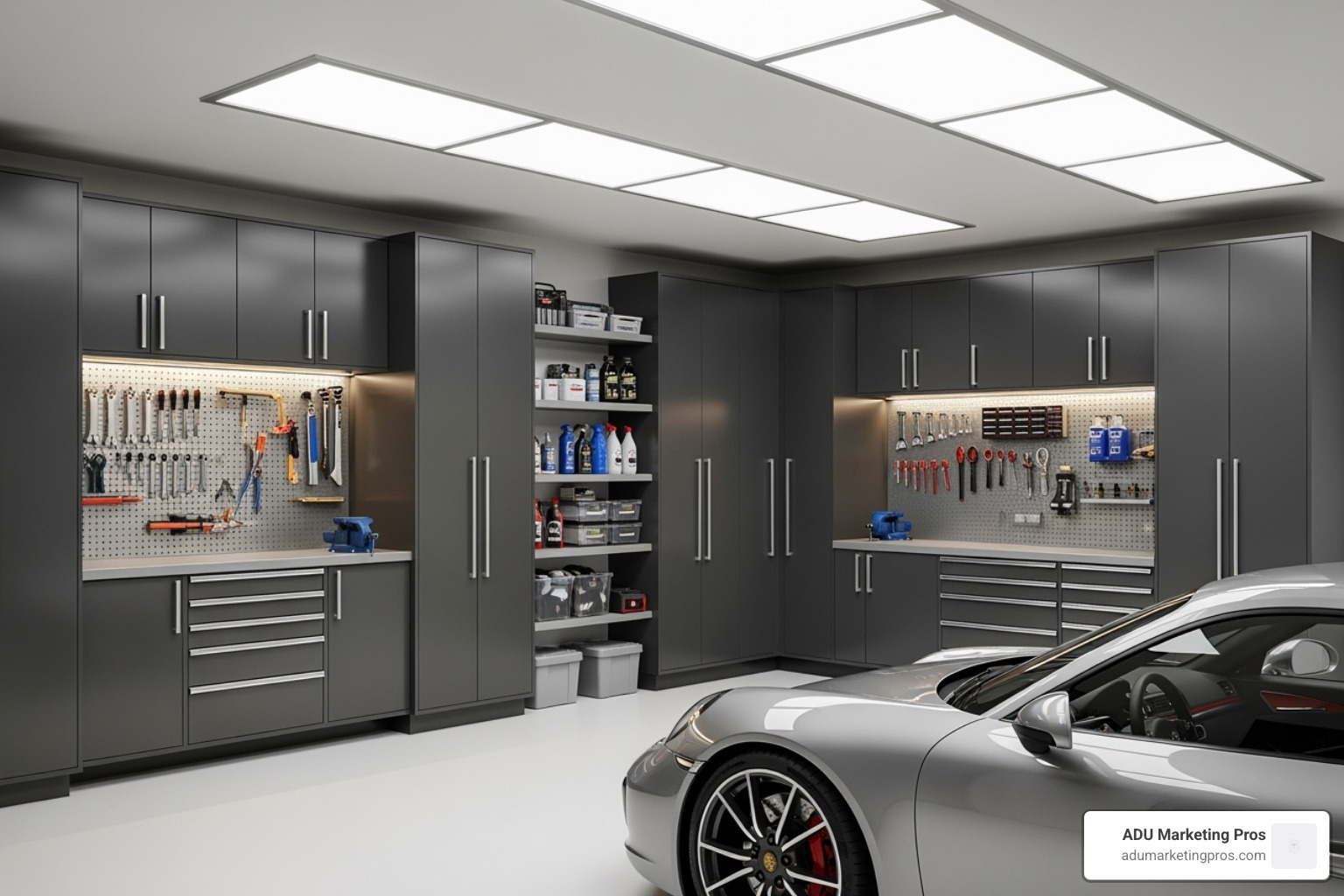
Understanding the Return on Investment (ROI) for a Garage Remodel
Garage remodels consistently deliver solid financial returns. Most homeowners can expect to recoup 64% to 85% of their investment upon resale. Depending on the project’s scope and the local market, a well-executed renovation can add $13,000 to $33,000 or more to your home’s value.
The top performer for ROI is often a garage door replacement, which can deliver a stunning 100% return on investment in many markets due to its immediate and dramatic impact on curb appeal.
Converting a garage into livable square footage is also a high-value project, especially in markets where space is at a premium. An ADU conversion, for example, not only adds to the property’s sale price but can also generate rental income, providing a continuous return. However, it’s crucial to understand your local market. In colder climates or neighborhoods where parking is scarce, removing the only covered parking space could potentially be a neutral or even negative factor for some buyers. For more data, the Remodeling Impact Report from the National Association of Realtors (NAR) offers detailed insights into how different projects affect home values and homeowner satisfaction (often called a “Joy Score”).
Smart Ways to Save on Your Garage Remodel Cost
Strategic planning and smart choices can help you stretch your budget without compromising on quality. Here are some effective ways to save money on your cost garage remodel:
- Prioritize Needs vs. Wants: Focus on essential functional and safety upgrades first (insulation, electrical, egress). You can always upgrade cosmetic finishes later.
- DIY Where It Makes Sense: Handle tasks like painting, demolition, installing pre-made shelving, or laying click-lock flooring yourself to save thousands on labor. However, always leave electrical, plumbing, and structural work to licensed professionals.
- Choose Materials Wisely: Opt for budget-friendly but durable materials. For example, choose luxury vinyl tile over hardwood, or a high-quality laminate countertop instead of quartz to get a high-end look for less.
- Get Multiple, Detailed Quotes: Obtain at least three itemized estimates from licensed and insured contractors. This allows you to compare not just the bottom line, but also the scope of work and material quality.
- Schedule for the Off-Season: Contractors are often busiest in the spring and summer. You may be able to negotiate better rates during their slower months in late fall or winter.
- Work Within the Existing Footprint: The most expensive changes involve moving walls, altering the roofline, or digging into the foundation. Keeping your remodel contained within the existing structure is the single biggest cost-saving measure.
- Budget for Surprises: Set aside 10-15% of your total budget as a contingency fund. This prevents unexpected issues like hidden water damage or outdated wiring from derailing your project.
Financing Your Garage Remodel
For larger projects, you may need to explore financing options. Popular choices include:
- Home Equity Line of Credit (HELOC): A revolving line of credit based on your home’s equity. You only pay interest on what you use, making it flexible for projects with uncertain costs.
- Home Equity Loan: A lump-sum loan with a fixed interest rate, ideal for when you have a firm project cost from a contractor.
- Cash-Out Refinance: Refinancing your mortgage for a higher amount and taking the difference in cash. This can be a good option if interest rates are favorable.
- Personal Loan: An unsecured loan that doesn’t use your home as collateral, but typically comes with higher interest rates.
As experts who help ADU builders market their services, we at ADU Marketing Pros know that a successful project starts with a solid budget and realistic expectations.
Frequently Asked Questions about Garage Remodel Costs
Planning a cost garage remodel can bring up many questions. Here are answers to some of the most common ones we hear from homeowners, helping you navigate the process with greater clarity.
Do I need a permit to remodel my garage?
Almost always, yes. While a simple cosmetic update like painting might not require one, permits are typically mandatory for any project involving:
- Structural Changes: Modifying load-bearing walls, altering the foundation, or changing the roofline.
- Electrical and Plumbing Work: Adding new circuits, outlets, fixtures, or running water and sewer lines.
- Change of Occupancy: This is the most critical one. Converting the garage from a storage/parking area (U-occupancy) to a livable space like a bedroom, office, or ADU (R-occupancy) always requires a permit.
Building conversion permits average around $1,400. While it’s an upfront cost, getting a permit ensures the work is done to code, protecting your safety and your investment. It also prevents fines, costly rework orders from the city, and major legal and financial issues when you eventually sell your home.
How long does a typical garage remodel take?
The timeline for your cost garage remodel depends heavily on the project’s scope and complexity.
- Planning Phase: This can take 2 weeks to several months. It includes creating a design, selecting a contractor, and obtaining permits. The permit approval process is often the longest and most unpredictable part.
- Construction Phase:
- Cosmetic Updates: 1-2 weeks.
- Full Remodels (Insulation/Drywall): 2-4 weeks.
- Living Space Conversions: 4-8 weeks or more, especially if a kitchen or bathroom is included, as this involves multiple trades and inspections.
Contractor availability, material delivery lead times, and inspection schedules can also affect the timeline, so it’s wise to build in a buffer.
Is converting a garage cheaper than building a new home addition?
Yes, in almost every case. Converting a garage is significantly more cost-effective than building a new addition from the ground up. The primary reason is that you are utilizing an existing structure—the foundation, walls, and roof are already in place, saving you tens of thousands of dollars.
- Cost per Square Foot: Garage conversions typically cost $50 to $200 per square foot, whereas new home additions often start at $150 and can easily exceed $400 per square foot.
- Utility Connections: It’s generally cheaper and easier to connect to existing electrical, plumbing, and HVAC systems from an attached garage than it is for a new addition.
Will converting my garage decrease my home’s value?
This is a common concern, and the answer is: it depends on your market. In many urban and suburban areas with ample street or driveway parking, converting a garage into a beautiful, functional living space or an income-generating ADU will almost certainly increase your home’s value. However, in regions with harsh weather or where off-street parking is highly valued and scarce, removing the only covered parking spot could be a drawback for some potential buyers. The key is to research your local market and consider a design that offers flexibility.
How do I find a reliable contractor for a garage remodel?
Finding the right contractor is critical. Look for professionals who specialize in renovations or garage conversions.
- Ask for referrals from friends, family, or local building supply stores.
- Check licenses and insurance. Verify their contractor’s license is active and that they carry both liability insurance and worker’s compensation.
- Review their portfolio and ask for references from recent clients.
- Get a detailed, written contract that outlines the full scope of work, materials, timeline, and payment schedule.
Can I legally rent out my converted garage?
Yes, but only if it’s converted into a legal Accessory Dwelling Unit (ADU). To be a legal rental, the unit must be permitted as an ADU, which has specific requirements for an entrance, kitchen, bathroom, and living/sleeping space. Simply finishing a garage and putting a tenant in it without the proper permits is illegal and can lead to significant fines and legal liability. Check your local city or county planning department for specific ADU regulations.
As experts who help ADU builders market their services, ADU Marketing Pros sees this as a smart way to maximize a property’s potential.
Conclusion: Is a Garage Remodel the Right Investment for You?
A cost garage remodel is a powerful investment in both your lifestyle and your property’s long-term value. With projects ranging from a simple cosmetic refresh starting around $3,000 to a full ADU conversion that can redefine your home’s functionality, a garage renovation offers unmatched flexibility. Financially, it’s a sound decision, with homeowners often recouping 64% to 85% of their costs at resale, and in some cases, creating a new stream of rental income.
However, a successful project hinges on diligent planning and realistic budgeting. Understanding the true costs, from labor and materials to permits and professional fees, is the most critical step. Securing the proper permits and hiring qualified, insured professionals are non-negotiable for ensuring a safe, legal, and high-quality outcome. In high-demand housing markets, a well-executed garage conversion can add significant value and opportunity, addressing modern housing needs while boosting your property’s appeal.
Your garage holds untapped potential. It could become the quiet home office you’ve always needed, a private gym, a guest suite for family, or a rental unit to help pay your mortgage. The question isn’t whether a remodel makes sense—it’s whether you’re ready to unlock the hidden value sitting just a few steps from your back door.
As experts who help ADU builders market their services, ADU Marketing Pros understands that a successful project begins with a solid budget and clear vision. We see firsthand how a well-planned garage conversion can transform a home and a homeowner’s life.
Ready to turn your garage dreams into reality? The first step is knowledge. Start by estimating your project’s potential cost.
Use our free garage conversion cost calculator to estimate your project


